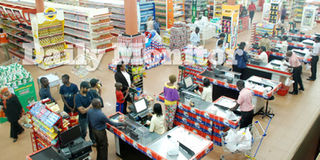Comesa in drive to skill SMEs for market access, quality products

Under local sourcing arrangement, local products should occupy at least half of the supermarkets shelves. This will help promote small and medium-sized enterprises raise quality products that conform to national standards. FILE PHOTO
The Common Market for Eastern and Southern Africa (Comesa) has embarked on a drive to promote Uganda’s agricultural commodities so as to boost the exports regionally and internationally.
This is against the backdrop of low competitiveness in producing goods and services that can be favourably traded in local, regional and global markets.
There is, therefore, the need to improve quality and consistency of supply as regards local products.
To empower
Because of this, there are trade deficits due to the continued export of mainly low-value unprocessed agricultural commodities compared to imports of highly valued manufactured products.
However, experts believe there is an urgent need to produce standards for quality and to empower Small and Medium Enterprises (SMEs) with the necessary skills.
Compete favourably
To bridge this gap, Comesa’s Business Council (CBC) and Private Sector Foundation Uganda (PSFU) are in an initiative to equip SMEs with the standards skills to enable them compete favourably through Local Sourcing for Partnerships (LSP) training.
“This training will help SMEs produce quality products as a way of preparing them to compete in local, regional and international markets,” says Sandra Uwera, the chief executive officer, CBC.
To promote local sourcing, LSP will target the enterprises within the hospitality and agro-industry sector to build their capacity on quality standards.
The project is supported by Investment Climate Facility for Africa (ICF), Usaid-IPAA and the private sector. It seeks to encourage a component on a responsible procurement policy that focuses on local supplier improvement mechanisms.
Its overall goal is to increase local sourcing from Small Growth Enterprises by large corporate companies in Comesa region in order to create jobs and economic development.
Stimulate development
The training that runs from April 5 to April 8 in Kampala, according to Uwera, will seek to build inclusive growth of SMEs in business processes, establish job creation of SMEs, contribute to overall improvement of intra-trade development in Comesa as well as promote and facilitate access to international market by local products.
The training is anchored on the theme—Building Sustainable Sourcing Partnerships Between SMEs and Corporate Companies.
“We anticipate that this training will go a long way stimulate Uganda’s development that supports the development of micro, small and medium-sized enterprises (MSMEs) such as agricultural based MSMEs to automated hi-tech industries,” Uwera noted.
Encourage growth
Additionally, as indicated by the Ministry of Trade, Industry and Cooperatives’ Buy Ugandan Build Uganda (BUBU) policy, 90 per cent of the private sector comprises MSMEs.
They provide employment to approximately 2.5 million people, contributing 75 per cent of the Gross Domestic Product (GDP).
However, experts say in order to grow MSMEs sustainably and increase local sourcing as per BUBU’s target, 20 per cent of government procurement by value should consist of local products and services.
At least 50 per cent of shelf space in supermarkets should be populated by local products while 50 per cent of local products should conform to national standards.
PSFU’s executive director Gideon Badagawa says: “Efforts such as the LSP training by CBC will augment the BUBU policy that encourages growth through increased local sourcing is a positive step that will help address Uganda’s trade deficit.”
Change perception
He adds that Uganda needs to ensure that all suppliers meet minimum requirements such as a certificate of company registration, a Tax Identification Number (TIN), Barcode/EAN number, proper packaging, expiry dates inscribed on products and the product ingredients displayed.
“Doing so will change the perception that local sourcing partnerships are viewed as difficult and unstable processes,” he noted.
LSP is being implemented in six Comesa member countries. So far, three—Zambia, Rwanda and Kenya—have received the training with more than 300 SMEs benefiting from it. The other countries to benefit are Uganda, Malawi and Ethiopia.
The project is carried out in collaboration with public and private sector bodies.
Export vs import
Figures from Uganda Bureau of Statistics (Ubos) show the trade deficit in the 2010-2014 period exhibited a decline. The year 2014 registered the highest trade deficit of $3,462.8m (Shs11.6 trillion) up from $2,583m (Shs8.9 trillion), which was recorded in 2010.
The drop is attributed to reduced export earnings estimated at $2,676.6m (Shs9.2 trillion) compared to increased imports estimated at $6,139.3m (Shs20 trillion) against the exports in 2014.
This increase in imports signifies the need to encourage the production and consumption of homegrown products.
Local sources
In order to further this effort, the Comesa Business Council (CBC) has entered into buyer agreements with a number of private sector companies, namely Serena Uganda, Serena Rwanda, Protea Kampala, Protea Lusaka and Taj Pamodzi Zambia, Inyange Industries and Bralirwa Ltd.
At the end of the project, a local sourcing recognition certificate will be awarded to corporate companies that promote local sourcing as practitioners of the Responsible Procurement policies in Africa such as the current Uganda Public Procurement & Disposal of Assets Act (PPDA).
Numbers
20
The value by which government procurement should constitute local products and services
50
percentage by which supermarkets shelves should have local products conforming to national standards




